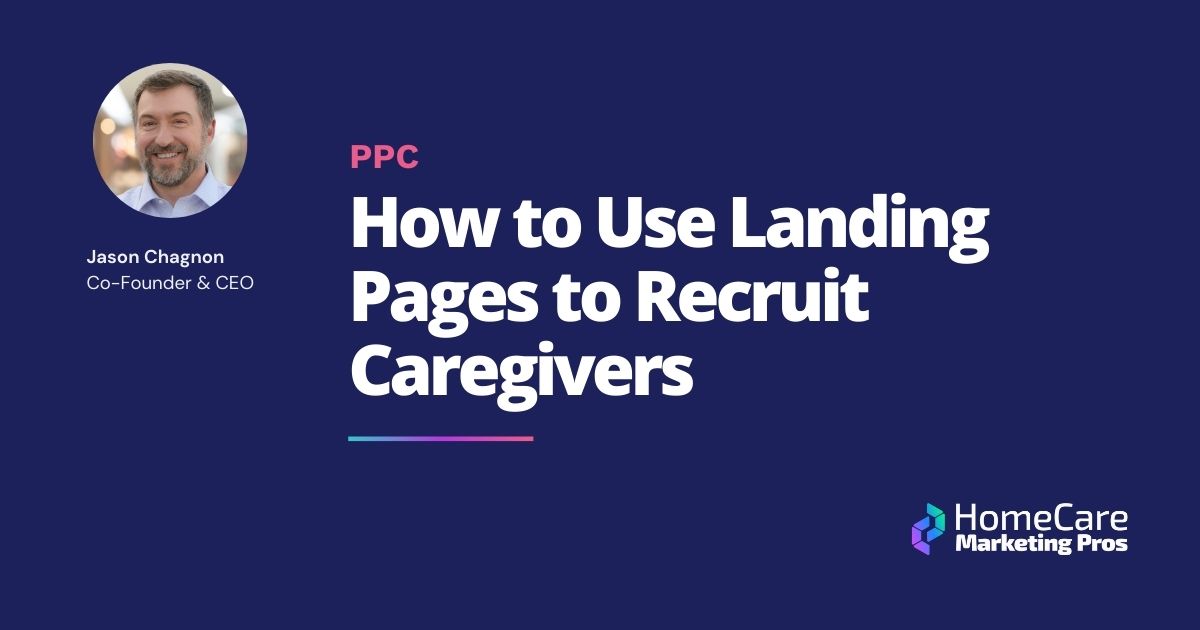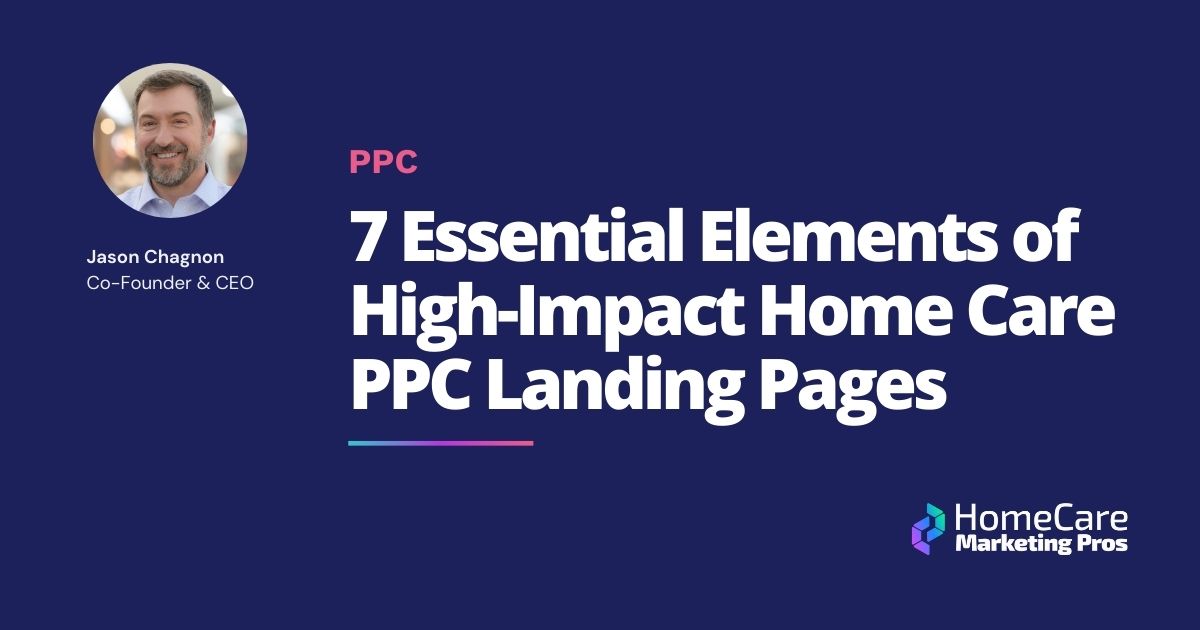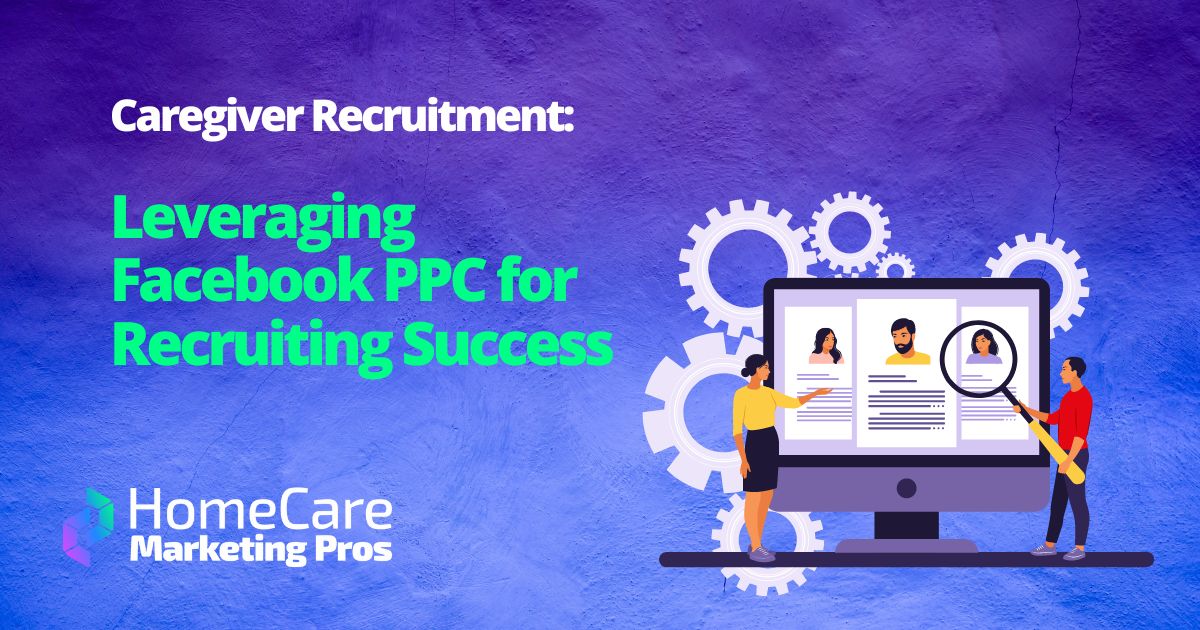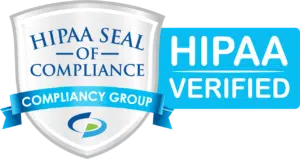The Complete Guide to Home Care Agency PPC
How to build, run, and optimize pay-per-click campaigns for your senior care agency
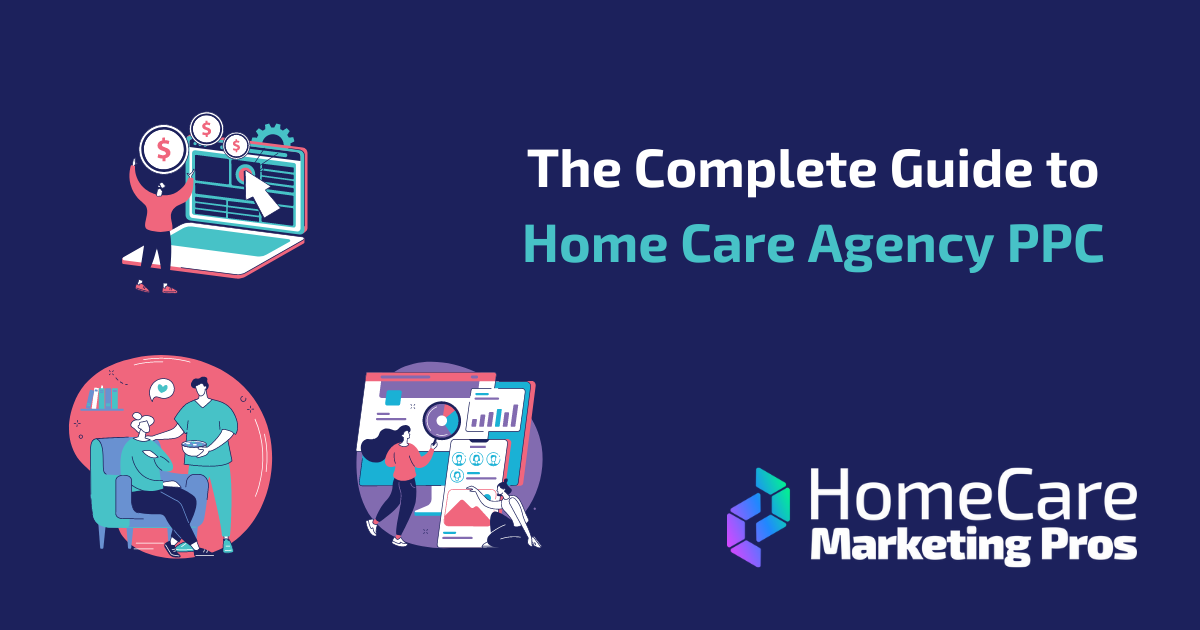
Digital marketing campaigns are a lucrative and necessary part of any home care agency’s marketing strategy. Yours may include search engine optimization (SEO), email newsletters, video campaigns, and social media marketing.
But does your home care agency strategy include PPC campaigns? PPC campaigns are a cost-efficient way to drive traffic to your key pages and add valuable client leads to your funnel.
Here’s everything you need to know about PPC for home care agencies.
What is PPC for home care?
PPC stands for pay-per-click, which means you pay only when a user clicks on your ad. It’s a very efficient way to get brand exposure and add interested potential clients to your sales funnel.
PPC ads can run across all kinds of digital properties, like:
- Search engines like Google, Bing, and YouTube
- Websites relevant to your audience, like news outlets
- Social media
- YouTube
- Mobile apps
PPC campaigns are most common on search engines. Why? Because running ad campaigns on search engines lets you target your ideal audience at exactly the moment they’re looking for a senior care agency like yours.
How PPC for home care works on search engines
Content optimized for search engines like Google and Bing is sometimes called “organic” content. These are the pages of your website (like your homepage, service page, and blog posts) that are written and coded with search engine users in mind.
While you may pay someone to create organic content, you can’t pay to place it on a search engine results page (or SERP), you have to earn it by making great content. However, you can pay to put your agency at the very top of a SERP—with PPC marketing.
Let’s take the Google SERP for the keyword senior care near me. A Place for Mom is running a PPC campaign on this keyword, and just look how much space it gets them, and on prime, top-of-the-page real estate too. Other PPC ads and the organic results have been bumped below the fold because this PPC campaign occupies so much valuable space.
When the page loads, they’re the only ones you see.
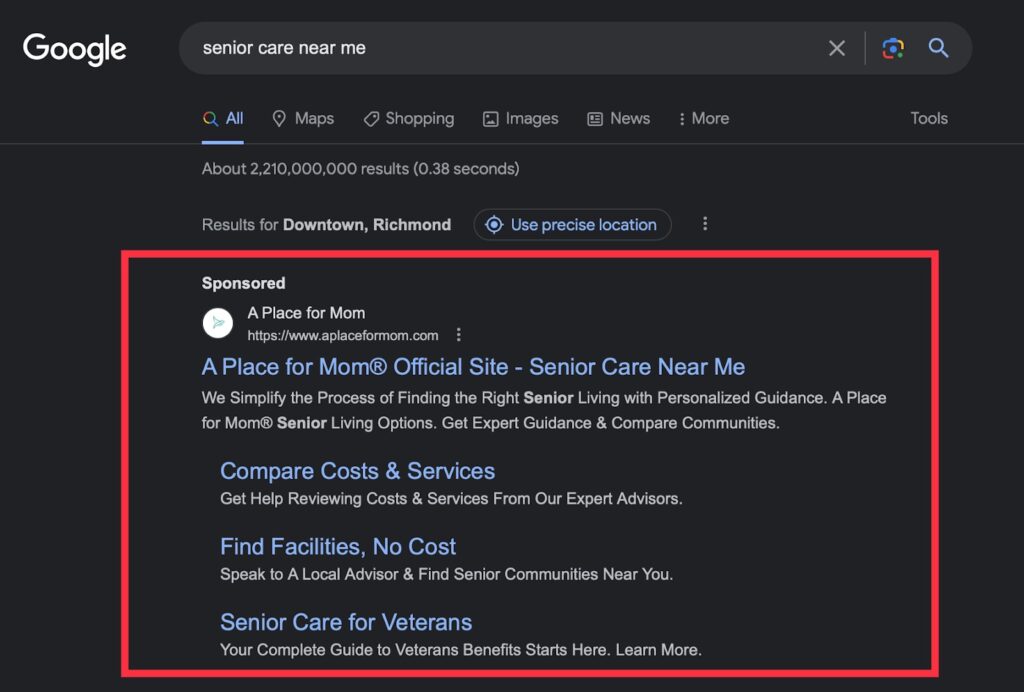
What are the types of PPC campaigns?
Pay-per-click refers to the cost model of the ad campaign, and PPC campaigns can take several forms:
1. Paid search
Paid search, or search engine marketing, is when you pay for your text-only ad to appear on a search engine results page, typically on a site like Google or Bing. PPC campaigns can help you occupy more real estate on a SERP, increasing the opportunities for users to land on your brand.
2. Digital display ads
Some display ad campaigns are pay-per-click. Display ads are those ads you see when browsing around the internet. On this Washington Post story about the increasing popularity of senior discounts, there are two ads. One for discount internet service, the other for investment advising. Clearly, these advertisers are targeting pages like this because of who might read this article.
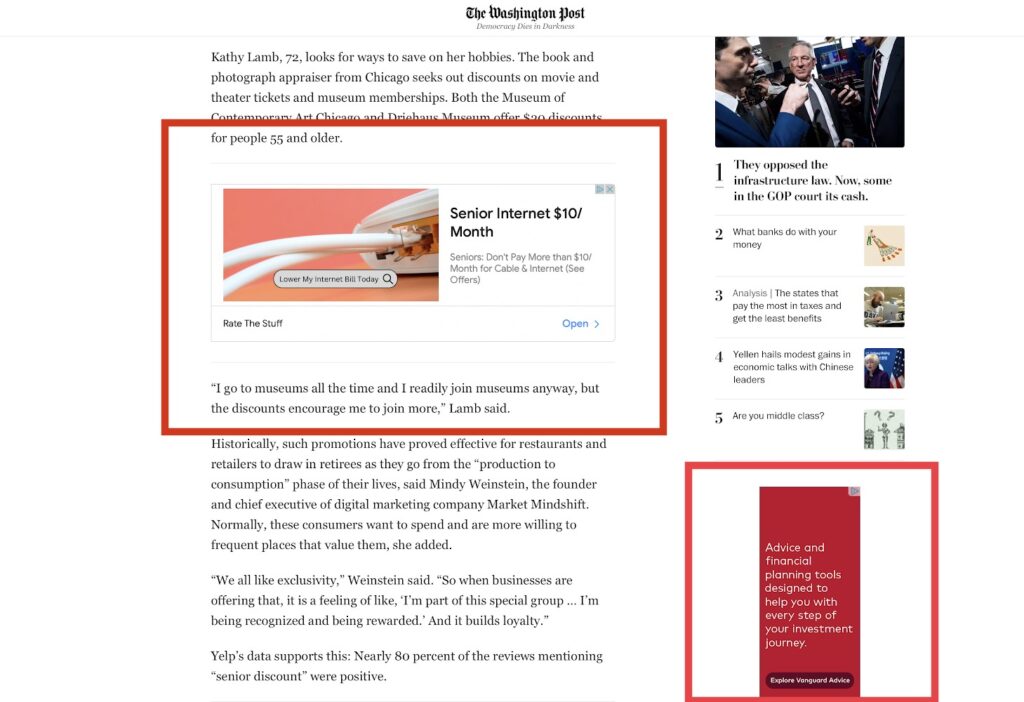
3. Paid social
Marketers can advertise on social media platforms like Facebook, TikTok, Instagram, Twitter, LinkedIn, and Nextdoor. On this Nextdoor feed, there are two PPC ads.
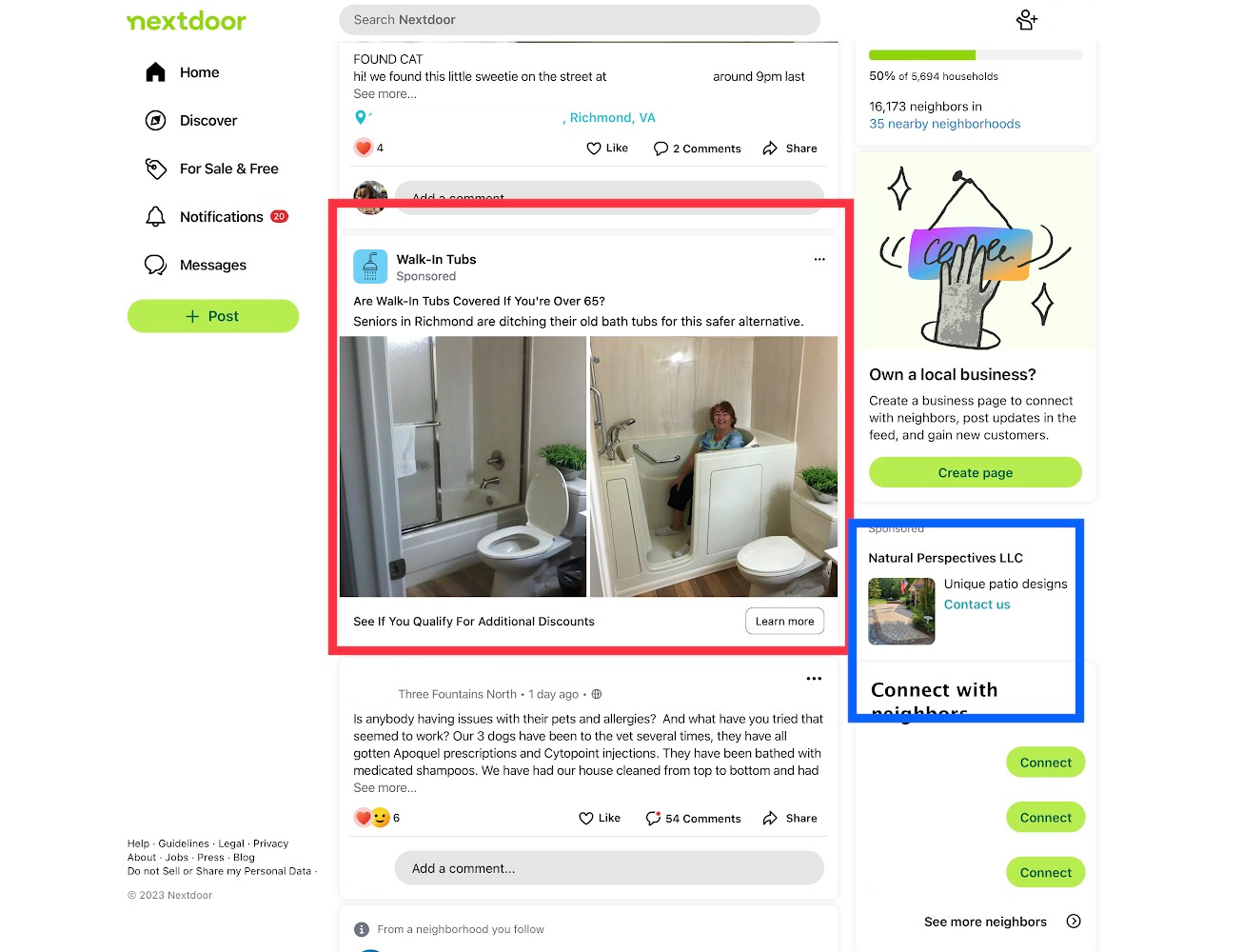
4. YouTube
YouTube is a search engine for videos, and it operates much like Google and Bing. PPC ads can be placed on YouTube SERPs as well. Check out these results for the keyword senior care technology, which features two PPC ads at the top.
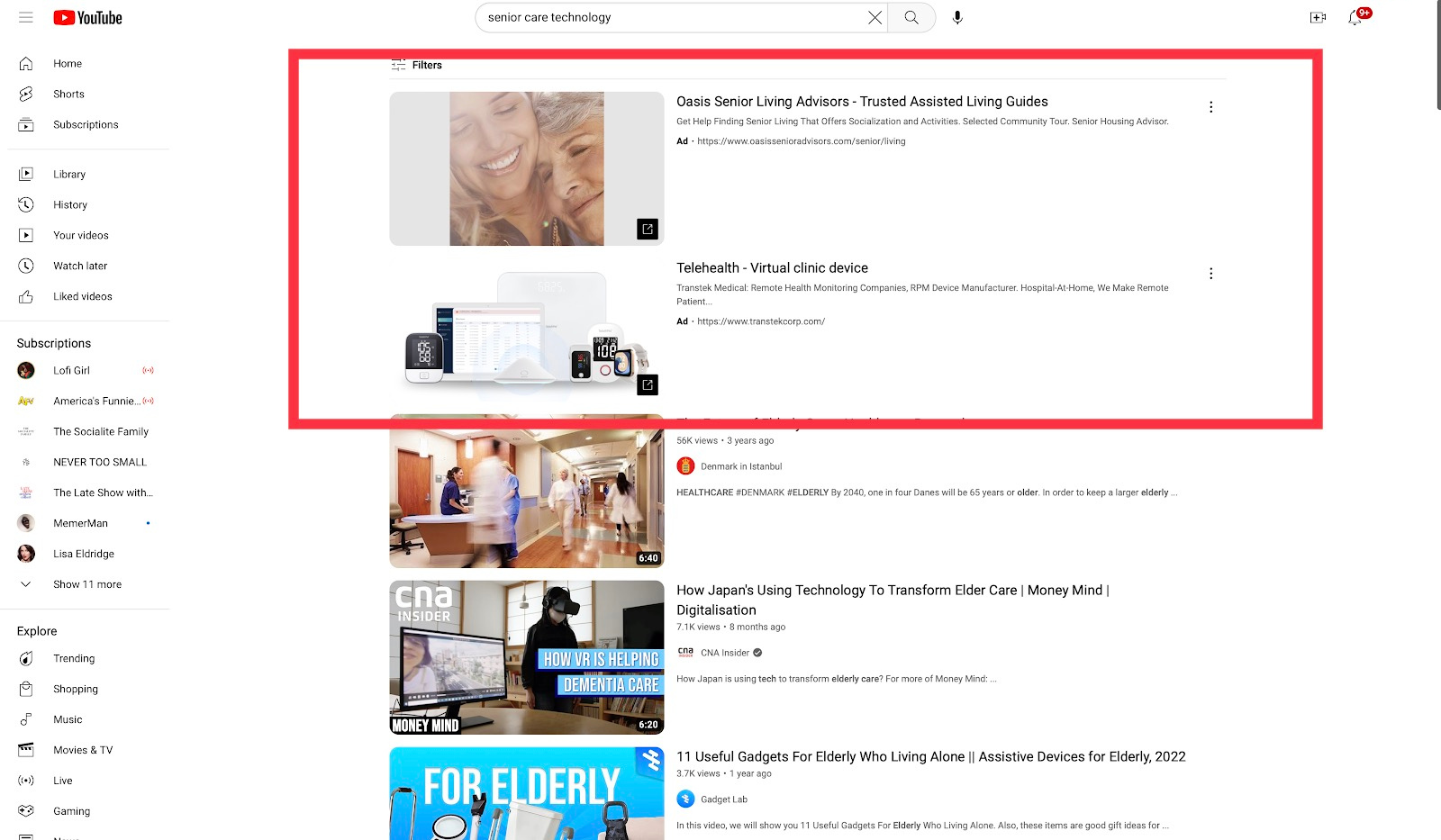
5. In-app marketing
Some apps even allow PPC campaigns, which are served while the app is in use. Sometimes they’re small, like in the example below from the Merriam-Webster dictionary app, while others are full-screen takeovers.
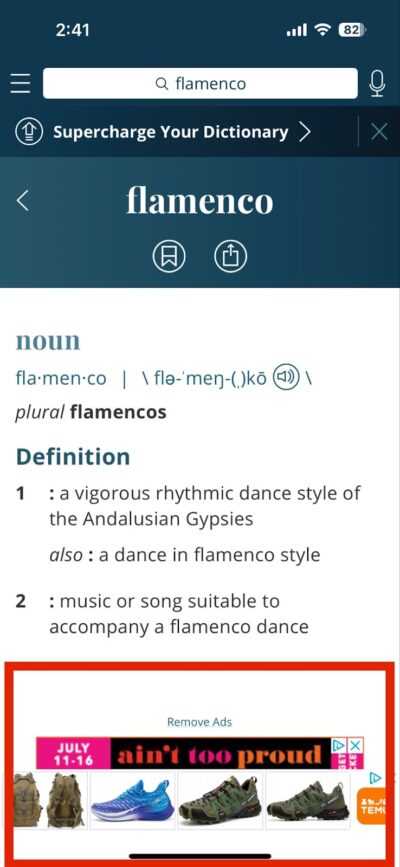
What type of PPC campaign should I run for my home care agency?
For home care agencies, we recommend PPC campaigns on search engines, or paid search marketing. Here’s why.
Launch campaigns quickly
Paid search campaigns can return results immediately. You don’t have to wait for your SEO pages to earn their spot on page one or for your social media accounts to gain followers, PPC campaigns can be up and running in just a few minutes, and you can start getting clicks as soon as an interested user sees your ad.
Plus, unlike social media or display ads, paid search campaigns are text-only, which means you can launch as soon as you write. No need to wait on photographers or designers.
Precisely target in-market users
It’s one thing to advertise your business to a user reading an article about, say, the popularity of senior discounts, like in the Washington Post example above. Sure, that reader may be a senior themselves or someone who takes care of an elderly relative, but it might also be someone interested in retail trends or consumer spending habits with no need for senior care at all.
When you use PPC search campaigns, however, you can target users searching for terms like senior care near me, home care agencies, and in-home care services for seniors. In other words, people who are actively looking for your services.
You can target user intent, and that’s a really powerful strategy.
Optimize in-flight to maximize returns
Let’s say you’re running a campaign to promote your new nutrition coaching services for diabetes patients. You’re using your paid ads to drive users to a landing page with gated content: a guide to diabetes nutrition.
You’re running the campaign with two messages. One with the headline Building a Healthy Diet for Seniors with Diabetes, and another that reads Building a Delicious Diet for Seniors with Diabetes. You learn that the latter far outperforms the former, so you decide to run the campaign using only the delicious diet message and your CPC goes down.
Gain insights about your target audience and ideal home care clients
You can also expect to learn a lot of rich information about who engages with your ads (by clicking on them, staying on the destination page, filling out contact forms, or bouncing) and who doesn’t.
Digital marketing is highly dependent on audience segmentation. Audience segmentation is a strategy that involves targeting users with similar characteristics, like age, gender, location, and income. When analyzing the results of the PPC campaign performance, you might learn that men are more responsive to your ads than women are, and expand your target audience.
How to run a Home Care PPC campaign
1. Set goals
The first step of designing a successful PPC campaign is identifying what you want to accomplish.
Do you want potential clients to provide you with their contact information? Download a guide on home care services, or sign up for an educational webinar? This will influence where you run ads, what they say, and where you send users once they click.
For lead gen campaigns, the number-one goal is typically gathering contact information from qualified leads.
Setting goals beforehand will also let you evaluate campaign success during and after.
2. Pick your platform
Google and Bing are popular places to run search ads, but you’re not limited to traditional search engines. YouTube is also a search engine, and PPC ads can be purchased there. Below you can see Google is advertising its PPC platform, called Google Ads, on YouTube for the keyword search, what is PPC.
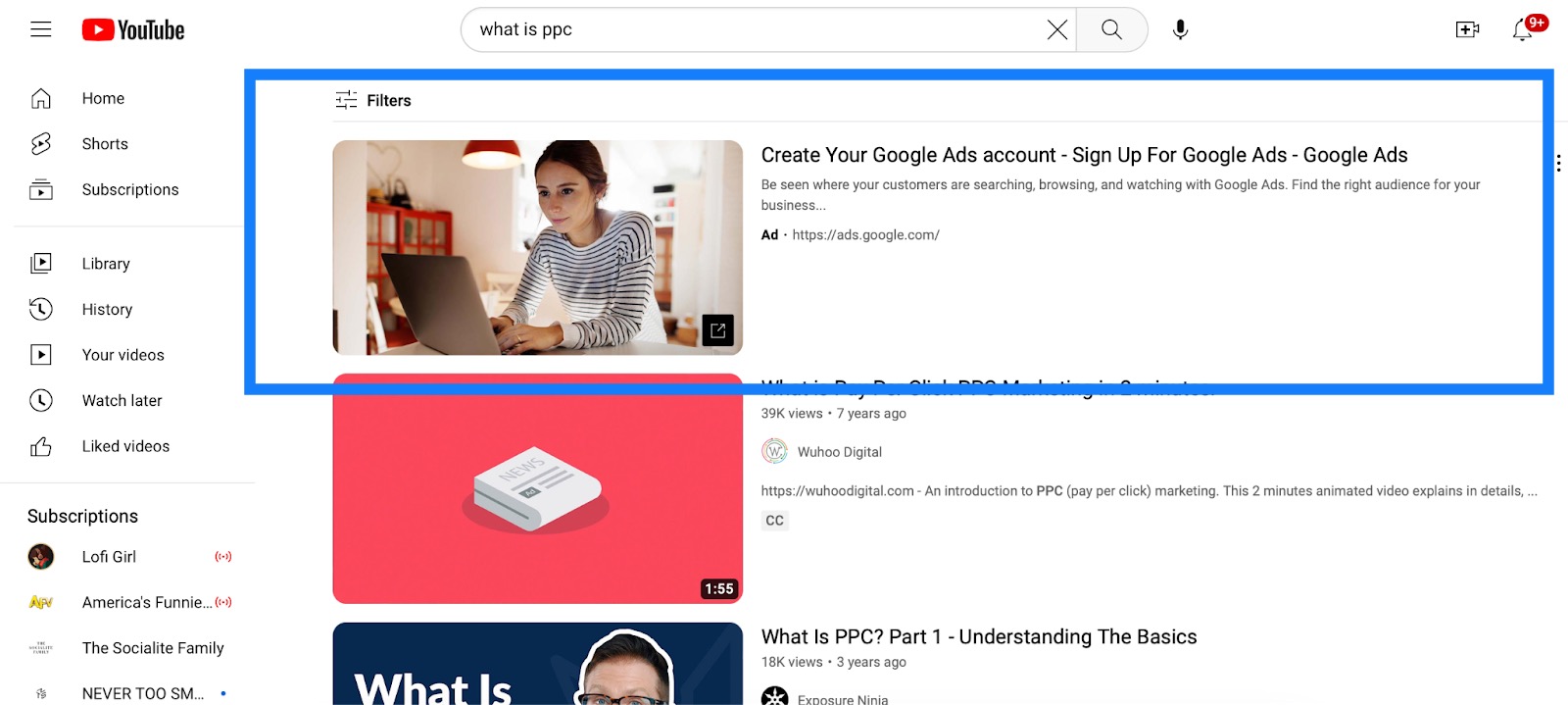
Home care marketers most often benefit from PPC campaigns on Google and Bing because you’re more likely to find users actively looking for services near your agency.
3. Conduct keyword research
Your paid search campaign depends on picking the keywords your ideal clients are searching for. Yours might be something like elder care or senior care.
When selecting keywords, balance search volume against how difficult it is to compete for that keyword. The Google Ads keyword planner is the best place to start.
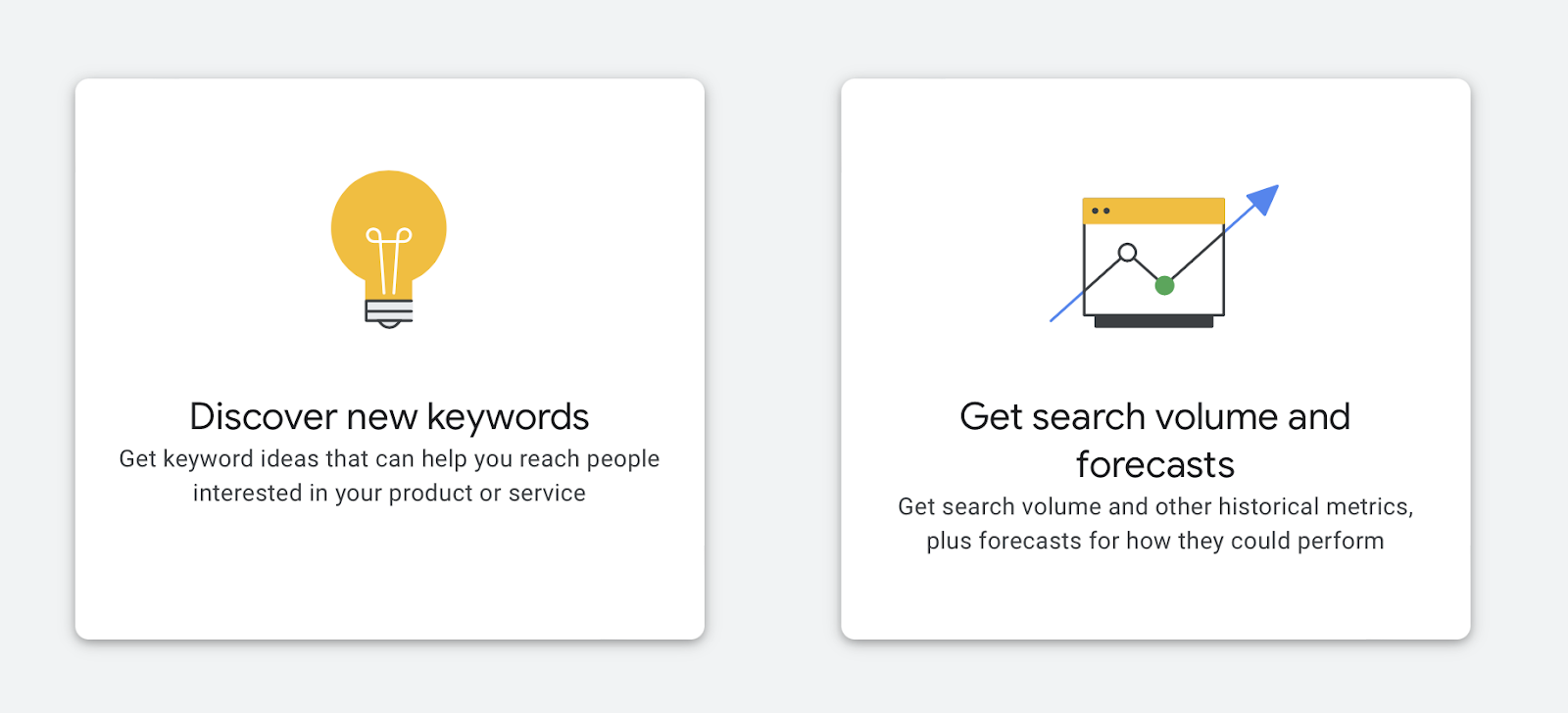
Start by typing in services you offer or keywords you’ve targeted for your organic SEO pages. Here, we’ve chosen senior care, in-home care services, and elder care at home, just to get started.
Google then provides you with a grid of information. When picking the keywords you want to bid on for your PPC campaigns, balance average monthly search volume with competition. Ideally, you want high volume (more people searching for that term) and low competition (the less it will cost you to run those ads).
We’ve checked some of the terms we might want to target. In addition, keep an eye out for terms adjacent to your services, like assisted living and retirement home. Those are users you can target in order to present them with in-home care as an alternative.
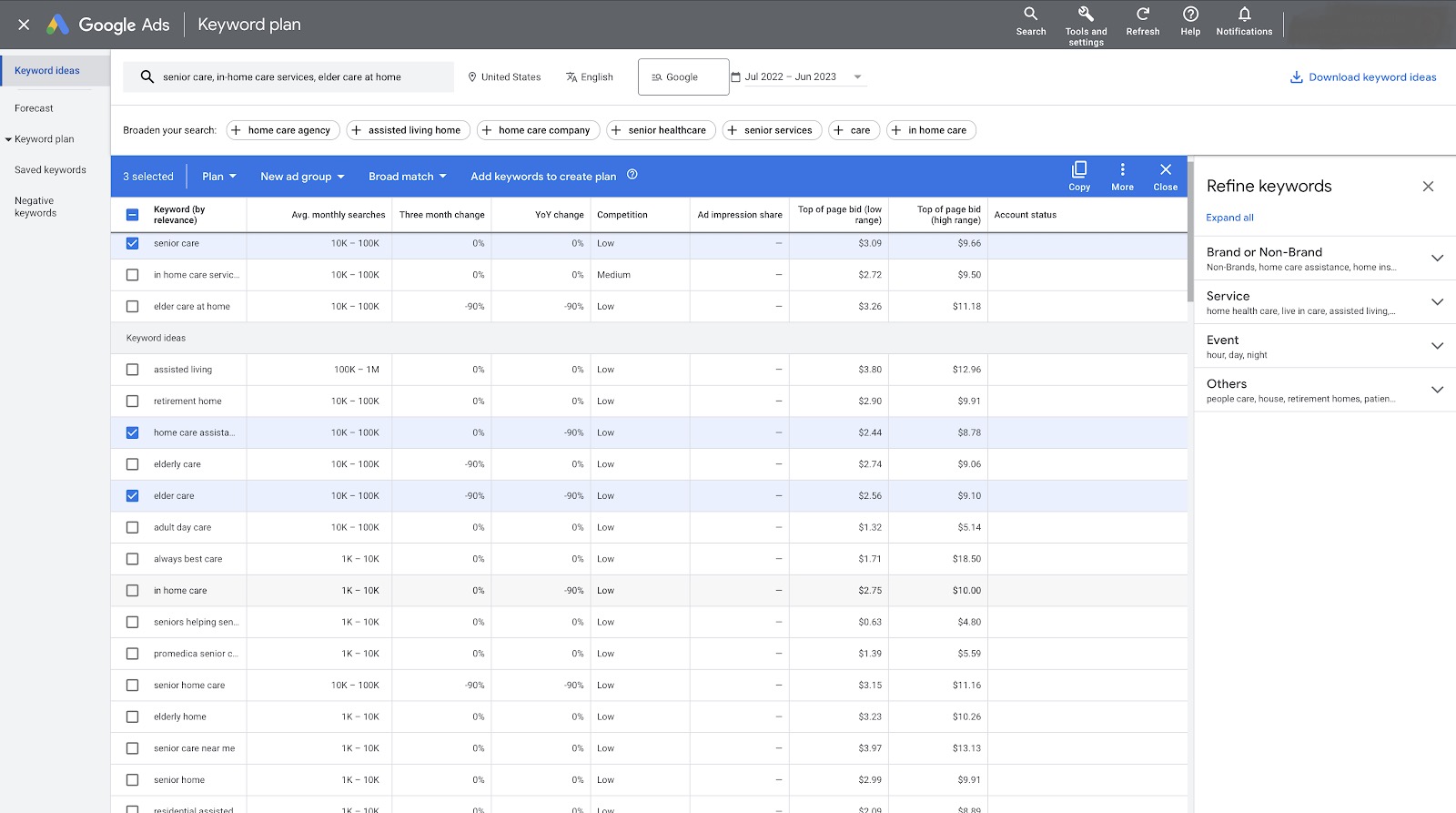
You’ll also notice that this grid includes two columns, labeled top of page bid (low range) and top of page bid (high range). This is an indication of how much you can expect to pay for a placement. Ideally, you find keywords with high search volume, low competition, and low bid ranges—but the best you can hope for is a balance of all three.
4. Write your ad copy
Next, write your ad copy. Your campaign messages should reflect the keyword you’re bidding on, the intent of the searcher, and their destination page. So if you’re bidding on the keyword at home senior care tampa florida, yours might read something like:
The Best In-Home Senior Care in Tampa
Stay at home longer and maintain independence. Learn more about cost, insurance, and home care assistance.
PPC campaigns are great for A/B testing campaign messages since you don’t have to lose money on the messages that flop, only time. So write a few and see which one performs better.
Not a writer? Get ideas by searching your target keywords and seeing what the competition is doing (don’t copy, improve!). Feel free to get ideas from generative AI tools. There are plenty of SEO and paid search tools out there that can give you ideas as well.
5. Pick their destination
Even if you write a great ad that gets users to click, that doesn’t mean you’ll be able to add them to your sales funnel. Make sure that when they click on your ads, their destination, usually called a landing page, gives them what they’re looking for (information about cost, for example), but also lets you collect their contact information.
Warning: Don’t just send users to your home page. Meet their specific needs as indicated by their search terms.
Just like ad messages, you can test landing pages (called a split test), to see which ones convert more leads.
6. Set your campaign parameters and run the campaign
Parameters include the amount of money you want to spend on your campaign, the keywords you want to target, the time of day you want them to run, and the audience segments you want to target.
7. Analyze your results
As soon as you start running your ads, you’ll start learning about what works and what doesn’t, and you can adjust to optimize your CPC and convert more leads.
Pay attention to the messages users are most likely to click on, the landing pages that collect the most information, and the audience segments most likely to engage with your ads. Use this information to make every campaign you run better and better.
PPC for Home Care FAQs
What are the types of PPC campaigns?
PPC campaigns can be run on search engines, social media platforms, websites (in the form of display ads), and in mobile apps.
What’s the best type of PPC campaigns for senior care agencies?
We recommend paid search for home care agencies, which allow you to launch more quickly, target more precisely, optimize in-flight, and gather more audience insights.
How much does PPC charge?
How much it costs to run a PPC campaign depends on the keywords you choose and the number of clicks your ads get. For home care keywords, expect to spend about $1.30–$12.00 per bid/click. Skilled home care marketers can create campaigns optimized for excellent CPC, and costs often go down and conversions go up over time.
Should you bid on your business’s name?
Yes! Running paid search campaigns on searches that include your agency’s name are a great way to occupy more space on page one and increase the likelihood that a user will click.
Should you bid on your competitors’ names?
It can be a good idea to bid on queries that include your competitors’ names, but we don’t recommend exhausting your entire budget here. It’s often more lucrative to bid on your own business name and general keywords that signal active intent.
Need a hand with home care PPC for your agency?
Home Care Marketings Pros' PPC experts can help you attract, engage, and convert clients and potential caregivers with our proven home care PPC strategies. Find out more by getting your quote!


